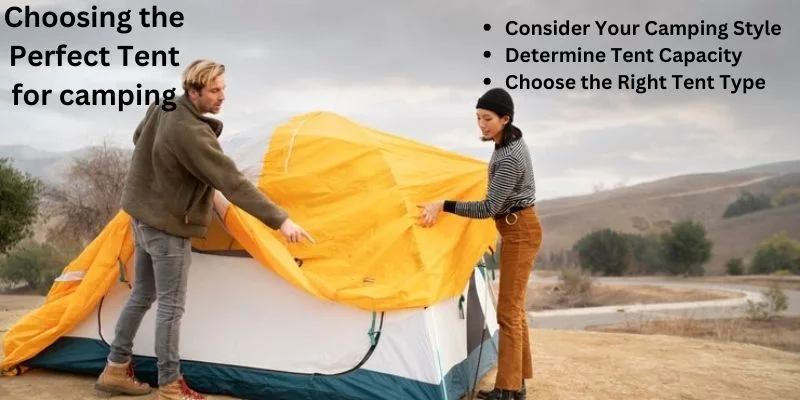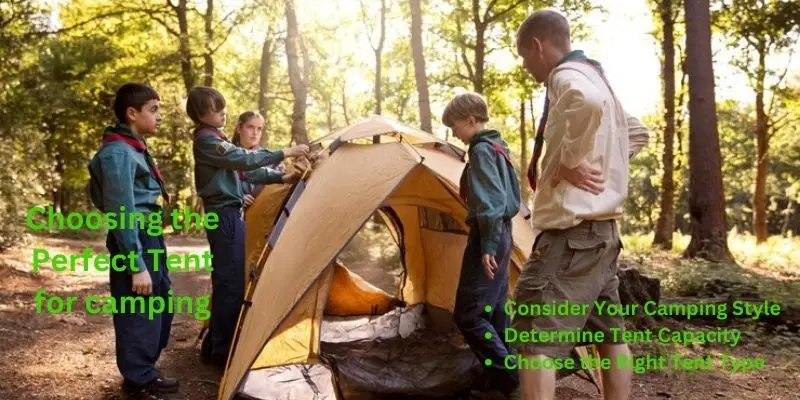10 Powerful Tips for Choosing the Perfect Tent for Camping: Ultimate Shelter Solution
Updated: 8 Aug 2024
223
Dreaming of a best campsite under the stars? A good tent is the key to a comfortable and secure outdoor adventure. With so many choices out there, it can be hard to know which one is right for you. Fear not, fellow campers! This guide unveils 10 powerful tips to help you find the perfect tent for your next camping trip.
From size and weatherproofing to ease of setup and handy features, we’ll break down everything you need to know to ensure a restful and unforgettable experience under the open sky. Picking the right tent can make or break your camping trip. It’s really important to choose one that fits you and what you like. This guide will show you how to pick the perfect tent for your camping adventure.
How Selecting The Best Camping Tent?
Selecting the best camping tent involves considering factors like size, weather resistance, and ease of setup. Look for features that suit your specific needs, such as ventilation for warmer climates or extra insulation for colder conditions. A well-chosen tent enhances your outdoor experience by providing comfort and protection from the elements.
Ten Tips For Choosing The Perfect Tent For Camping
1. How You Like to Camp
Are you going alone? Camping with a partner? Or bring the whole family? Do you prefer car camping or backpacking? Your camping style will dictate the size, weight, and features you need in a tent.

2. Determine Tent Capacity
Tent capacity refers to the number of people a tent can comfortably accommodate. Keep in mind that tent capacities can vary widely between manufacturers, so it’s essential to consider not only the number of people but also the available space for gear and other belongings.
3. What Kind Of Tent Is Best
There are lots of different kinds of tents. You can find dome tents, cabin tents, tunnel tents, and more. Each type has its advantages and disadvantages, so consider factors like weather resistance, ease of setup, and interior space when making your decision.
4. Check Weather Resistance
Weather resistance is crucial when choosing a tent, especially if you plan to camp in varied conditions. Look for tents that are strong and won’t break easily. Make sure they can keep you dry in rain or snow. Check if they have extra covers and tight seams to stop water from getting in.
5. Evaluate Tent Weight and Size
If you’ll be backpacking to your campsite, tent weight and size are essential considerations. Opt for lightweight, compact tents that won’t weigh you down on the trail. Conversely, if you’re car camping, you can prioritize comfort and spaciousness overweight.
6. Assess Ventilation and Condensation
Proper ventilation is essential to prevent condensation buildup inside your tent, especially during warmer weather. Look for tents with mesh panels, windows, and vents to promote airflow and keep you cool and dry throughout the night.
7. Consider Setup and Ease of Use
Nobody wants to spend hours struggling to set up their tent, so consider the ease of setup when making your decision. Look for tents with intuitive designs, color-coded poles, and simple assembly instructions for a stress-free camping experience.
8. Think About Durability and Longevity
Investing in a durable tent is essential if you plan to use it for multiple camping trips. Pay attention to the quality of materials, construction, and warranty offered by the manufacturer to ensure your tent will withstand years of use in the great outdoors.
9. Decide How Much You Can Spend
The cost of a tent depends on its size, what it’s made of, and the brand. Decide how much money you can spend before you start looking. Make sure the amount you choose fits what you need and like. Remember that a higher price doesn’t always guarantee better quality, so shop around and compare options before making your purchase.
10. Read Reviews and Do Your Research
Finally, take the time to read reviews and do your research before settling on a tent. Read what other campers say about the tent. Find out how it works in real life if it lasts a long time, and if it’s worth the money.
Tent Selection Tips By Season
Think about what time of year you’ll be camping. Choose a tent that will keep you comfy and safe in that kind of weather. Here are some tips for selecting the right tent based on the seasons:

Spring and Summer Camping
- Opt for a lightweight and breathable tent with ample ventilation to keep you cool during warm weather.
- Look for tents with mesh panels, windows, and vents to promote airflow and reduce condensation buildup.
- Consider a tent with a rainfly that can be rolled back or removed for stargazing on clear nights.
- Choose a tent with UV-resistant materials to protect you from the sun’s harmful rays during daytime use.
Fall Camping
- Select a tent with sturdy construction and weather-resistant materials to withstand cooler temperatures and potential rain or wind.
- Look for tents with a full-coverage rainfly and sealed seams to keep you dry and comfortable in wet conditions.
- Consider a tent with a vestibule or awning for storing wet gear outside the main sleeping area to prevent moisture buildup inside the tent.
- Choose a tent with a durable floor material to protect against cold and damp ground.
Choosing the right tent is essential for a successful camping trip. It’s like finding your home away from home in the great outdoors.John Smith, Outdoor Enthusiast
Winter Camping
- Opt for a four-season tent specifically designed to withstand harsh winter conditions, including snow, wind, and freezing temperatures.
- Look for tents with reinforced poles, snow skirts, and steep sidewalls to shed snow and withstand strong winds.
- Consider a tent with multiple ventilation options to prevent condensation buildup while still retaining warmth.
- Choose a tent with a reflective interior to trap heat and keep you warm during cold nights.
- Inspect the tent’s materials and construction to ensure they can withstand the rigours of winter camping without compromising safety or comfort.
A well-chosen tent can turn a camping trip into a memorable adventure. It’s the cornerstone of comfort and protection in the wilderness.Sarah Jones, Camping Blogger
Heat For Tent Camping
| How Heated The Tent Camping |
|---|
|
Best Tent Brand Comparison
| Features | REI Co-op | The North Face | Marmot |
| Weather Resistance | 4-season | 4-season | 4-season |
| Ventilation | Multiple mesh windows | Adjustable vents | Strategic vent placement |
| Quick Setup | Color-coded poles | Single-pole design | Easy pitch |
| Size & Weight | Range of sizes | Lightweight options | Lightweight materials |
| Materials & Durability | Durable fabrics | Ripstop nylon | High-denier fabric |
| Cost | Mid-range | Premium | Mid to high-range |
Camping Tent For Truck
Truck tents offer a unique camping experience by transforming your vehicle’s bed into a comfortable sleeping and living space. These versatile tents provide the freedom to camp almost anywhere, making them ideal for overlanding adventures. With a truck tent, you can enjoy the convenience of having your gear readily accessible while immersing yourself in the great outdoors.
Pros and Cons of Choosing the Perfect Tent for Camping
| Pros |
|---|
|
| Cons |
|---|
|
Conclusion
Your camping adventures deserve a great tent. Compare tents from REI, The North Face, and Marmot to find the perfect one for you. Look at how they’re made, what they’re made of, and what other campers think. Choose a tent that will keep you safe and comfortable, no matter the weather. With the right tent, you’ll have amazing camping trips!
Picking the right tent is super important for a fun and safe camping trip. Do your homework, think about what you need, and choose a tent that you’ll love.
FAQs
Can I use a 4-season tent for all types of camping?
No, a 4-season tent is not for all camping trips. These tents are built to handle really bad weather, like snow and strong winds. They might not be comfy in hot weather because they don’t let in much air.
What is the difference between a lightweight and heavy-duty tent?
Light tents are made from lighter stuff and are easier to carry. Strong tents are made from tougher stuff and are better at withstanding bad weather, but they’re heavier to carry.
How important is ventilation in a camping tent?
Ventilation is really important in a tent. It helps keep the air fresh and stops water from building up inside. This makes your tent more comfortable and keeps your stuff from getting wet.
Can I pitch my tent by myself?
Some tents are easy to put up by yourself, but it’s a good idea to try putting up your tent before you go camping. That way, you know how to do it when you’re out there.
What should I consider when choosing the size of my tent?
Think about how many people will sleep in the tent, if you need space for stuff or pets, and if you like lots of room. Also, check how long, wide, and tall the tent is. Choose a tent that fits what you need and want for camping.
Please Write Your Comments